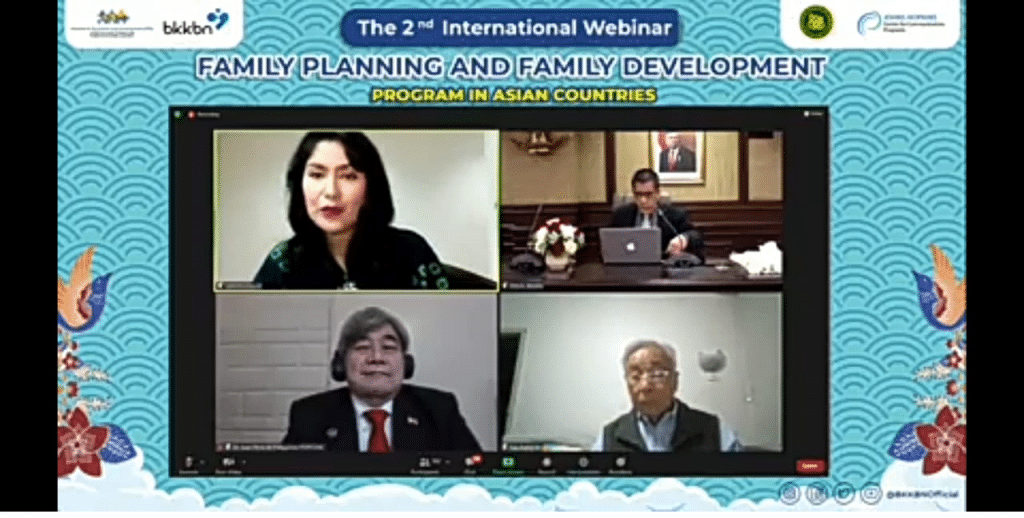In many countries, the Family Planning (FP) program has generated vital contributions to many aspects of life. FP provides numerous benefits, including better quality of life as well as improved health, education, and welfare, even opening jobs. FP’s benefits were the common thread in the 2nd International Webinar titled “Family Planning and Family Development” organized by the Centre for International Training and Cooperation (CITC) in Population and FP of the National Population and Family Planning Board (BKKBN) of Indonesia with the support of Partners in Population and Development (PPD), Johns Hopkins Centre for Communication Program (JHCCP), and the Commission on Population and Development (POPCOM Filipina), on Tuesday (17/11/2020). “FP program ensures that the needs of families are met, which is critical to realize universal access to reproductive healthcare,” said BKKBN Chairman DR (H.C.) dr. Hasto Wardoyo Sp.OG (K) in his opening remarks. Hasto added that Indonesia is highly committed to the ICPD25 Programme of Action, “A commitment to, among others, accelerate the reduction of mortality rate among pregnant women and unmet need.”

Hasto also said that the International Conference on Population and Development (ICPD) Programme of Action 1994 in Cairo, which was adopted by 179 countries, has remained relevant in guiding countries in addressing population challenges and issues. To attain the goals and ambitions of ICPD and to accelerate the implementation of the 2030 Sustainable Development Agenda, the United Nations Population Fund (UNFPA) together with the governments of Kenya and Denmark hosted the Nairobi Summit on ICPD25: Accelerating the Promise on 12-14 November 2019. The Summit noted that, after 25 years of ICPD, numerous success stories have emerged from around the world. Globally, maternal mortality rate (MMR) has been reduced by 40%; in the Asia-Pacific alone, MMR decreased by 56% between the years 2000 and 2017. Despite the progress, there are still millions of women and men around the world with unmet need. There are communities around the world, especially marginalized groups, who have continued to face discrimination and barriers to access to sexual and reproductive care. As per today, there are more than 200 women and female adolescents in the world without access to FP services. In Indonesia, and in other countries, violence and discriminative practices against women and children have persisted – a situation that becomes even more severe in humanitarian emergency conditions. Dangerous practices, such as child marriage and female genital mutilation, have also continued to exist. In 2019, it was estimated that 10 million girls globally would be married before they reached 18 years old. In the Asia-Pacific, 140 million females do not have access to modern contraceptives. Many among them are female adolescents who lack access to sexual and reproductive care. Around 79,000 cases of maternal deaths were recorded in the region; Indonesia also has a high number of maternal deaths and the highest among ASEAN countries.
ICPD’s end goal is to improve the quality of life of the generations today and tomorrow. To that end, every country must be able to meet the needs of its people, including the most vulnerable and marginalized: women, girls, persons with disabilities, and indigenous communities. This is a responsibility of all nations. Hasto believed that, with stronger cooperation and greater investments, sustainable development for all that accommodate local practices can be realized. “This webinar is part of the ongoing efforts to strengthen and improve the relationship between developing countries. [It provides] wider access to exchange of knowledge and experience,” said Hasto.
 Meanwhile, Dr. Adnene Ben Hak Aissa, Executive Director of PPD, informed the audience that the world’s population grows by 80 million people per year. “The total fertility rate creates a burden. It creates a burden for the economy, job creation, and resources such as clean water. Investments are needed in many areas,” he said. According to Adnene, Bangladesh has made significant investments for FP and ICPD outcomes in 2020. “This is the kind of excellence we find among PPD member countries,” he added. Adnene also outlined the benefits of FP and how investments have improved the life quality of communities in Africa and Asia. “FP has brought down mortality rate and improve performances across health, job creation, and education sectors.” Adnene also commended BKKBN for having the most advanced FP program among other member countries. “And we support that outcome. Thailand has also shown significant change, as does Bangladesh with its notably reduced MMR through the implementation of stronger capacity building activities.”
Meanwhile, Dr. Adnene Ben Hak Aissa, Executive Director of PPD, informed the audience that the world’s population grows by 80 million people per year. “The total fertility rate creates a burden. It creates a burden for the economy, job creation, and resources such as clean water. Investments are needed in many areas,” he said. According to Adnene, Bangladesh has made significant investments for FP and ICPD outcomes in 2020. “This is the kind of excellence we find among PPD member countries,” he added. Adnene also outlined the benefits of FP and how investments have improved the life quality of communities in Africa and Asia. “FP has brought down mortality rate and improve performances across health, job creation, and education sectors.” Adnene also commended BKKBN for having the most advanced FP program among other member countries. “And we support that outcome. Thailand has also shown significant change, as does Bangladesh with its notably reduced MMR through the implementation of stronger capacity building activities.”
The webinar featured speakers Dr. Ir. Lilis Heni, Public Health Specialist and Demographer of Universitas Indonesia; Prof. Gu Baochang, Demographer of Renmin University, China; Dr. Juan Antonio Perez, Executive Director of the Commission on Population and Development (POPCOM) Philippines and Prof. Rizal Damanik PhD, Deputy for Training, Research, and Development of BKKBN. Meanwhile, Prof. Aris Ananta PhD, President of Asian Population Association (APA); and Prof. Peter Mc. Donald, Emeritus Professor at the Australian National University and Honorary Professor at the University of Melbourne were present as discussants.

